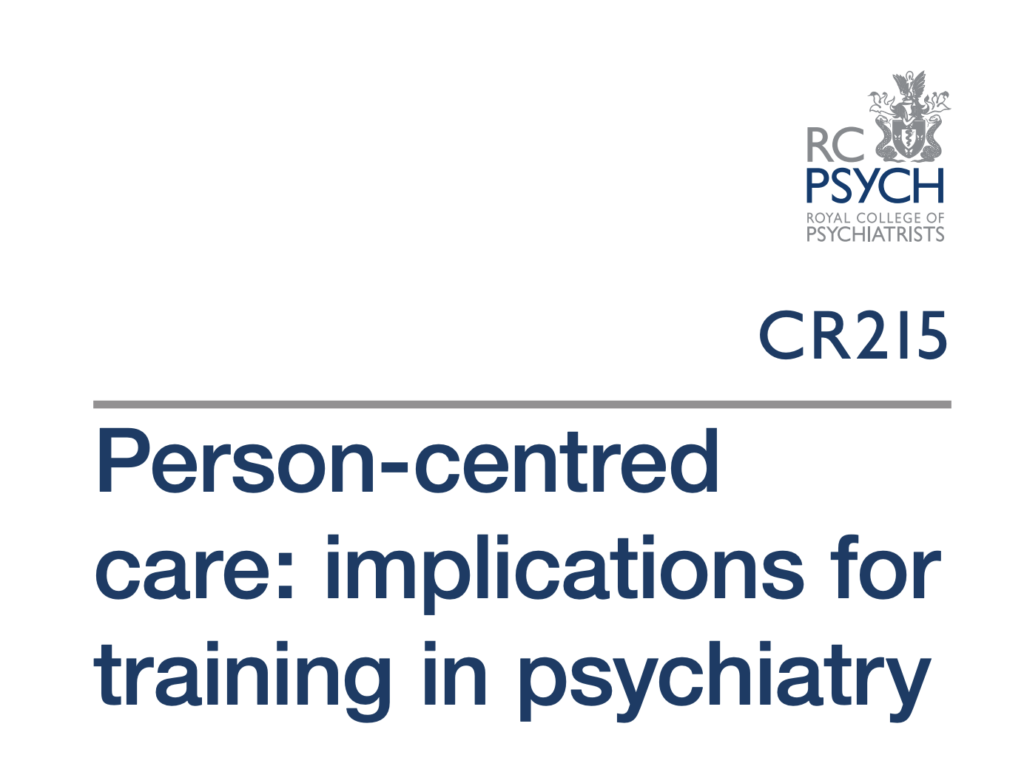
The desired practice of medicine (if not always, for everyone, the observed reality) has changed radically over recent years. There is more emphasis on individualised care, closer attention to the needs and values of people who use health services, and recognition of the importance of those who deliver health services working collaboratively with those who use them.
So this report, from the Royal College of Psychiatrists (RCPsych), is very welcome. It considers in depth what ‘person-centred care’ actually means and provides suggestions for how the curriculum for training psychiatrists should be revised. The stated aims are to:
- Review the case for strengthening the focus on the person in clinical practice – giving person-centred approaches a central position in the practice and training of psychiatrists
- Outline the rationale for embedding person-centred practice in postgraduate training and assessment
- Provide recommendations to enable the delivery of person-centred care through postgraduate psychiatric training and assessment.
However, this topic is certainly far from novel to the woodland. We have had previous discussions about the lack of meaningful service user involvement in care planning in both adults (Carr, 2016) and young people (Tomlin, 2017). Practice can be very difficult to change.

This new report (PDF) from the Royal College of Psychiatrists considers in depth what ‘person-centred care’ actually means and provides suggestions for how the curriculum for training psychiatrists should be revised.
Methods used to produce the report
The report was jointly authored by the Person-Centred Training and Curriculum (PCTC) Scoping Group and the Special Committee on Professional Practice and Ethics of the RCPsych chaired by Drs. Jed Boardman and Subodh Dave with input not only from other committee members but a list of other advisers.
The scoping group reviewed the literature and took evidence from people who have used services, patient representatives and members of the RCPsych. It also looked at the 2013 Core Curriculum Survey, carried out a content analysis of the current core curriculum, and a survey of trainees and MRCPsych course organisers.
Findings
Unsurprisingly, the authors found an extensive literature that supports the benefits of a person-centred approach, and that it is universally endorsed. The overarching idea is an ethical one: that ‘patients should be treated as persons’ (Entwistle & Watt, 2013).
The curriculum survey revealed surprising gaps in learning related to therapeutic relationship building and a survey of MRCPsych courses showed patchy availability of person-centred training across the country, despite an overwhelming wish for its inclusion in psychiatric training on the part of both trainers and trainees.
Additionally, although it signals the importance of respect towards people who use services, the current curriculum makes no reference to the terms: ‘co-production’, ‘values’, ‘personalisation’, ‘personal budgets’, ‘ethics’, ‘human rights’, ‘self-care’ or ‘self-directed care’, nor does it sufficiently emphasise the community context of people’s lives.
These and other concepts related to person-centred care including shared decision-making, personal recovery, values-based practice, social inclusion, compassion, empathy, kindness, spirituality, patient narratives and formulation skills are briefly discussed. Barriers to implementation are also considered including clinicians’ attitudes and knowledge, organisational culture and leadership, and resource constraints with the comment that:
psychiatrists’ own assessment of their person-centred care may not always be accurate (Goossensen et al, 2007)
There is also recognition that despite our often-positive self-perception:
psychiatry needs to embrace the central principle of personhood, described by Bill Anthony as simply ‘people with severe mental illness are people’ (Anthony, 2004)

The authors found lots of evidence that supports the benefits of a person-centred approach. They also acknowledge that person-centred care is universally endorsed.
Conclusions and recommendations
Changes are recommended in 5 areas, of which the first 2 are substantial:
1. Revising the curriculum
There is a strong emphasis on the importance of language:
The language of the curriculum should reflect its ‘person-centred’ nature.
- Patients are people first and people’s lived experience of mental health challenges occur in the lived experience of their life ‘as a whole’
- People must be afforded dignity, compassion and respect
- Psychiatrists need to provide a collaborative or co-productive approach to decision-making:
- Offer coordinated and personalised, care, support or treatment
- Support people to recognise and develop their own strengths and abilities, discovered collaboratively, so as to enable them to live an independent and fulfilling life.
- Enable people to positively contribute to their own care and treatment and to learn from and value their experience.
Relational competences related to person-centred care (e.g. shared decision-making, self-directed support, co-production, collaborative care, support-planning) should be included in the curriculum. Furthermore, competences related to broader aspects of person-centred care should also be included (e.g. ethics, human rights, community engagement, social inclusion).

We need to teach trainee psychiatrists about shared decision-making, self-directed support, co-production, collaborative care, support-planning, ethics, human rights, community engagement and social inclusion.
2. Postgraduate psychiatric training
- Postgraduate psychiatric training courses should ensure that the psychiatrists of tomorrow have embraced the Core Values for Psychiatrists (PDF)
- Strengthen the role of service users, carers and patient representatives in planning and delivering psychiatric education, and guidelines should be created for working inclusively and mindfully with people who use services in delivering training
- Trainees should be involved in Recovery Colleges or related opportunities in their local area. There should also be more joint training opportunities for psychiatrists with both other medical professionals and mental health professionals
- Organisers of training should be helped to embed person-centred care in training placements.

Postgraduate psychiatric training courses should ensure that the psychiatrists of tomorrow have embraced the Core Values for Psychiatrists (PDF).
There is less to say about the last 3 points, but I will summarise them here:
3. Assessment
- Person-centred care competencies should be adequately and appropriately assessed in examinations.
4. Quality assurance
- Health Education England (HEE) and its counterparts in the devolved nations must ensure that benchmarks and quality assurance criteria used to assess training include reference to person-centred care
- The RCPsych must also develop mechanisms to assure and demonstrate that core values and objectives are consistently both being delivered by training and assessed.
5. Values: reinforce the importance of the core set of values for psychiatrists
- All RCPsych publications and documents should demonstrate consistency with the document Core Values for Psychiatrists (PDF) (College report; Richards & Lloyd, 2017)
- Values-based skills training should be incorporated into the curriculum which should be amended to explicitly demonstrate its consistency with the core values for psychiatrists, including person-centred practice.
Strengths and limitations
Strengths of this report include:
- Multidisciplinary working group with advice and input from service users
- Informed by data sources including a survey and content analysis of the curriculum
- Balanced review with clear recommendations for change.
However, there are also weaknesses:
- Given the recommendations for joint training, perhaps the group authoring the report should have been broader? There does not appear to have been any input from nursing, social work or clinical psychology colleagues
- Considering the importance of this topic to so many stakeholders, an opportunity for wider consultation on a draft would have been very welcome.

A significant number of people receiving psychiatric care are not treated with the utmost dignity within our services that a true ‘person-centred’ approach would ensure.
Implications for practice, training, policy and future research
Many people are very satisfied with the care that they receive from psychiatrists, but there is no doubt that a significant number of people are not treated with the utmost dignity within our services that a true ‘person-centred’ approach would ensure. This is not only a problem for psychiatry but the other mental health professions too. It is also particularly difficult in an era of fragmented care where building therapeutic relationships sometimes seems harder than ever. If I had to choose one single thing that would improve the chances of achieving a more person-centred approach, it would be addressing the lack of continuity of care.
I have spent many years working with psychiatrists and other professionals, particularly general practitioners, helping them to develop their listening and talking skills using feedback in which doctors review a recording of their conversation with a service user, real patient or role-played patient in a group setting. This can change the way that doctors behave, but we seem to provide this experience much less in postgraduate psychiatric education than we used to. General practice training has led the way here, and we have a lot to learn from it.
Some will be critical about the current emphasis on using the ‘right language’ rather than what goals doctors want to achieve by using particular words and skills (Galasiński, 2018) and I have some sympathy with that view. I would also counsel the importance of encouraging trainees to approach some of the potential learning opportunities mentioned here with a critical eye. It is difficult to be consistent with the core value of providing ‘evidence-based care’ if innovations are yet to be fully evaluated (yes, I am thinking of Recovery Colleges here). I would also question exactly how ‘person-centred’ some of these innovations, driven powerfully forwards by policy developments, actually are (see Recovery in the Bin’s excellent critiques on the topic).
But the fundamental driver behind this document is a desire to improve the quality of care that people receive in our mental health services. For this the authors should be lauded for producing a ground-breaking document that will stimulate discussion, action and, I hope, evaluation of whether it really can bring about change.

Postgraduate psychiatric education could learn a lot from the video feedback offered to general practitioners during listening and talking skills training.
Links
Primary paper
Royal College of Psychiatrists (2018) Person-centred care: implications for training in psychiatry (PDF). College Report 215.
Other references
Anthony WA (2004) The principle of personhood: the field’s transcendent principle. Psychiatric Rehabilitation Journal, 27: 205. [APA abstract]
Carr S. (2016) Empowering, personalised and recovery-focused care planning and co-ordination: When will we ever learn? The Mental Elf 25 May 2016.
Entwistle VA, Watt IS (2013) Treating patients as persons: a capabilities approach to support delivery of person-centered care. American Journal of Bioethics, 13: 29–39.
Galasiński, D. (2018). Language and psychiatry. The Lancet Psychiatry, 5(3), 200-201.
Goossensen A, Zijlstra P, Koopmanschap M (2007) Measuring shared decision making processes in psychiatry: skills versus patient satisfaction. Patient Education and Counseling, 67: 50–6. [PubMed abstract]
Richards V, Lloyd K (2017) Core Values for Psychiatrists (College Report CR204). Royal College of Psychiatrists.
Tomlin A (2017) Person-centred care in CAMHS, how can we make it happen? The Mental Elf 25 April 2017.
Photo credits
- Photo by Chase Clark on Unsplash
- Photo by Lucrezia Carnelos on Unsplash
- Photo by Ian Schneider on Unsplash
- Photo by @gebhartyler on Unsplash
- Photo by Seth Doyle on Unsplash

In reading this report and especially when considering implementing any of its recommendations, it is important to remember that psychiatrists in training are people too. The vast majority of those embarking on a career in medicine start off as compassionate and considerate individuals. However, there is evidence that something happens during the course of training and work which erodes these qualities (1, 2, 3). It is vital that this report is not used as yet another stick with which to beat junior doctors but that we also ask why there is a decrease in empathy and compassion as doctors progress through training and find ways of addressing this as well.
References
1. Hojat M, Vergare MJ, Maxwell K, Brainard G, Herrine SK, Isenberg GA, Veloski J, Gonnella JS . The devil is in the third year: a longitudinal study of erosion of empathy in medical school. Acad Med. 2009;84(9):1182-1191.
2. Diseker RA, Michielutte R. An analysis of empathy in medical students before and following clinical experience. J Med Educ. 1981;56(12):1004-1010.
3. Hojat M, Mangione S, Nasca TJ, et al. An empirical study of decline in empathy in medical school. Med Educ. 2004;38(9):934-941.
DOI: I am a co-author of the report.
The problem here is that psychotherapy is not a one-size fit all. We have to treat people as individuals and respect their model of the world.
[…] Person-centred care: challenges and changes to the training of psychiatrists […]